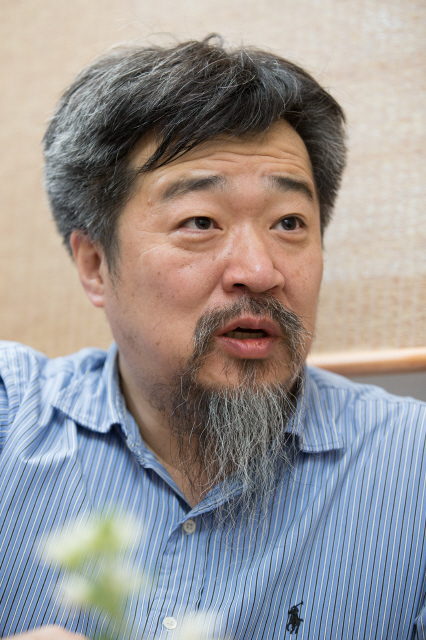 |
Han Hong-koo, Sungkonghoe University professor
|
Recent conservative administrations abandoned plans for smaller, more humane military, in the name of ‘strength’
By Choi Hyun-june, staff reporter
“The more open the military is to the outside world, the fewer deaths occur there.”
Han Hong-koo was blunt in his telephone interview with the Hankyoreh on Aug. 4. The Sungkonghoe University professor was a civilian member of a temporary 2005 committee to improve military barracks culture, and many kinds of stories about the military feature prominently in his books, including his “History of the Republic of Korea.”
According to Han, the fast way to reduce the number of accidents and incidents in the military is to open the military up to the outside.
“During the Yushin era [between 1972 and 1981], there were 1,500 deaths a year,” he said. “When a soldier died in those days, you never saw a word about it in the news media. It was later, when society became democratized and incidents in the military became publicized, that the number of deaths dropped by a factor of ten.”
Since 2003, the number of deaths in the military has been between 110 and 150 per year.
“It’s nonsense the way people talking about these soldier suicides and deaths being the result of ‘weak discipline,’” Han said.
“It’s already too late for a lot of people, but we need to institute a military ombudsman so the private sector can monitor the military more tightly,” he advised.
Han cited administrative factors as a major issue in the April beating death of a private first class surnamed Yoon, which has drawn major public attention to the issue of violence in the military.
“After the Lee Myung-bak administrations and the conservatives came to power, human rights in the military became seen as something too silly to talk about,” he explained.
According to Han, the issue of military human rights can be traced to a more general retreat of democracy in South Korean society.
“The reason deaths haven’t decreased is because the previous government’s attempts to focus on the military human rights issues were completely discarded to make a ‘strong military,’” he explained.
“During the democratic administrations [of Presidents Kim Dae-jung and Roh Moo-hyun, from 1998-2008], the Presidents stressed military human rights, and officers who were focused on promotion had to pay attention to the issue,” he added.
A greater trend toward brutality and the emergence of an “ostracism culture” are other factors that can’t be ignored, Han said.
“The environment in small units was actual better in the past,” he explained. “It looks like things like the Yoon incident or the shooting spree in the 22nd Infantry Division [by a sergeant identified by his surname Lim] started occurring with the recent emergence of exclusion based on induction term and humiliation techniques like being forced to pose in stress positions while naked.”
According to Han, the military judicial system should be overhauled to reduce cover-up attempts. The problem, he said, is that the system has the military investigating itself.
“South Korea follows the example of the US military judicial system, which has separate military courts,” he explained. “But the US system is one with a lot of overseas bases. South Korea has a prosecution and court system that extends to the neighborhood level, so that kind of thing isn’t really necessary.”
As a farther-reaching solution, Han called for improved treatment of soldiers.
“Soldiers become easier to manage when they have stronger rights,” he said.
In his view, the current system, where soldiers manage each other while earning just 100,000 won (US$97) a month, leads inexorably to brutality.
“There’s really no need for us to maintain 600,000 troops in a modern war environment where you’re fighting with state-of-the-art weaponry,” he added.
“The idea of a 600,000-person army exists to protect the interests of the generals. It’s not actually intended to increase our ability to defend ourselves,” he argued.
Instead, Han called for an alternative military service system, where young men judged likely to end up “requiring close attention” are allowed to perform other, non-military roles.
“It’s unfortunate that the system the Roh administration planned to implement ended up being abandoned under Lee Myung-bak,” he said.
Please direct questions or comments to [english@hani.co.kr]




No comments:
Post a Comment